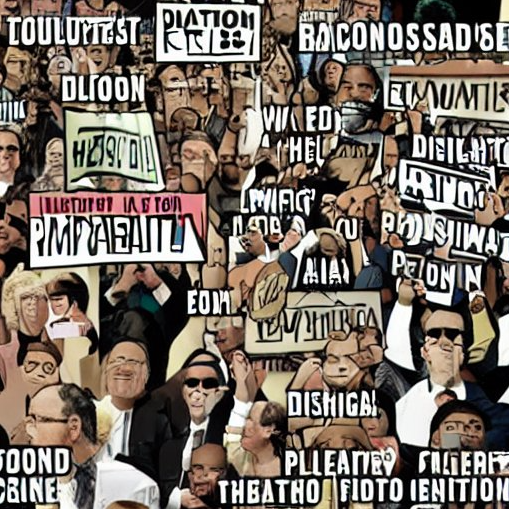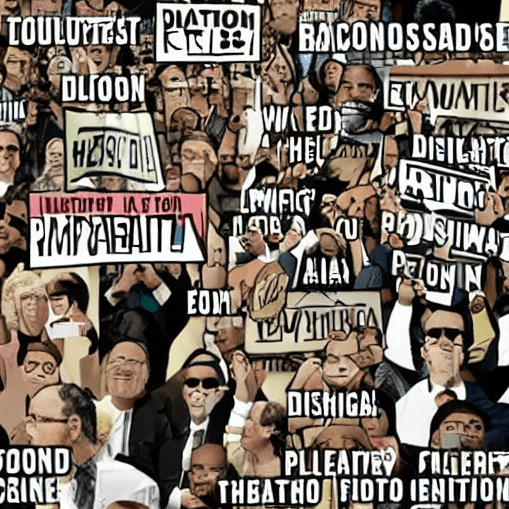Phobia indoctrination is one of the principle ways a charismatic leader will lull potential followers into his thrall, by putting them into a state of perpetual fear and anxiety. They know, either instinctively or through training (or both), that people can be induced into a prolonged state of confusion easily, and that many people in states of confusion act quite irrationally. Abusers, cult leaders, and other controllers use demagoguery and other tricks to hide in plain sight and continue to accrue power while passing themselves off as harmless or extremely patriotic.
These chaos agents use emotional manipulation and other tactics of emotional predators as a tool of control. They whip followers up into a fear frenzy frequently enough to instill a set of phobia-like instinctual reactions to chosen stimuli. In addition to stoking fears of the enemies at the gates, they also inculcate irrational fears of the consequences of questioning their authority — invoking authoritarianism. Any doubts expressed about the leadership or its doctrine are subject to terrifying negative results. Cults use this formula to wield undue influence over followers, and prevent them from questioning or leaving the group.
Phobia indoctrination is a tool of cults
As part of a larger overall program of brainwashing or mind control, cults and destructive organizations use imaginary extremes (going to hell, being possessed by demons, failing miserably at life, race war, Leftist apocalypse, etc.) to shock followers into refusing to examine any evidence whatsoever. A form of unethical hypnosis, phobia indoctrination can now be carried out on a mass scale thanks to the internet and our massive media apparatus. Be sure to be on the lookout for any cult warning signs in groups and messaging all around you.
Sociopaths and other types of emotional predators are taking ample advantage of their advantage in time and distance over the slow pace of justice. The wielding of fear as a cudgel in American politics has reached a fever pitch, with anti-Critical Race Theory hysteria, anti-vaxxers, anti-government types, anti-science, Lost Cause-revival zombie MAGA footsoldiers screeching about the “freedom!!!” they wish the government to provide them for persecuting their enemies, and other social horrors are merely the tip of the climate changing iceberg.


Phobia indoctrination tactics
Strategies of phobia indoctrination include Repetition and Conditioning, where fears are built through constant exposure; Misinformation and Propaganda, using false information to paint something as dangerous; Utilizing Existing Fears, exaggerating known fears or anxieties; and Social Pressure and Group Dynamics, leveraging social influences to convince others that irrational fears are common.
Other tactics include Authority and Expert Manipulation, where false credentials are used to lend legitimacy; Emotional Manipulation, appealing directly to emotions; Isolation and Control, where a person’s environment is manipulated; and Media Manipulation, using media to provoke fear.
Phobia indoctrination and cults book list:
- Demagogue for President: The Rhetorical Genius of Donald Trump — Jennifer Mercieca
- Losing Reality: On Cults, Cultism, and the Mindset of Political and Religious Zealotry — Robert J. Lifton
- The True Believer: Thoughts on the Nature of Mass Movements — Erich Fromm
- The Cult of Trump: A Leading Cult Expert Explains How the President Uses Mind Control — Steve Hassan
- The Republican Brain: The Science of Why They Deny Science–And Reality — Chris Moody
- Terror, Love and Brainwashing: Attachment in Cults and Totalitarian Systems — Alexandra Stein
- A Brief History of Fascist Lies — Federico Finchelstein
- The Paranoid Style in American Politics — Richard Hofstadter
- Authoritarian Nightmare: Trump and His Followers — John Dean and Bob Altemeyer
Or, support local bookstores instead of Jeff Bezos:
- Losing Reality: On Cults, Cultism, and the Mindset of Political and Religious Zealotry
- The True Believer: Thoughts on the Nature of Mass Movements
- Demagogue for President: The Rhetorical Genius of Donald Trump
- The Cult of Trump: A Leading Cult Expert Explains How the President Uses Mind Control
- The Republican Brain: The Science of Why They Deny Science–And Reality
- Terror, Love and Brainwashing: Attachment in Cults and Totalitarian Systems
- A Brief History of Fascist Lies
- The Paranoid Style in American Politics
- Authoritarian Nightmare: Trump and His Followers
Related to phobia indoctrination:
Cult Dictionary ↗
We had better get familiar with the lexicon and vocabulary of the coming era, so we can fight the creeping scourge of thought control roiling the land.


Disinformation Dictionary ↗
Disinformation is meant to confuse, throw off, distract, polarize, and otherwise create conflict within and between target populations.


Cult Warning Signs: How to recognize cultish groups ↗
Recognizing cult warning signs can be vital in identifying and understanding the risk before getting involved with a group who may not have your best interests in mind.





